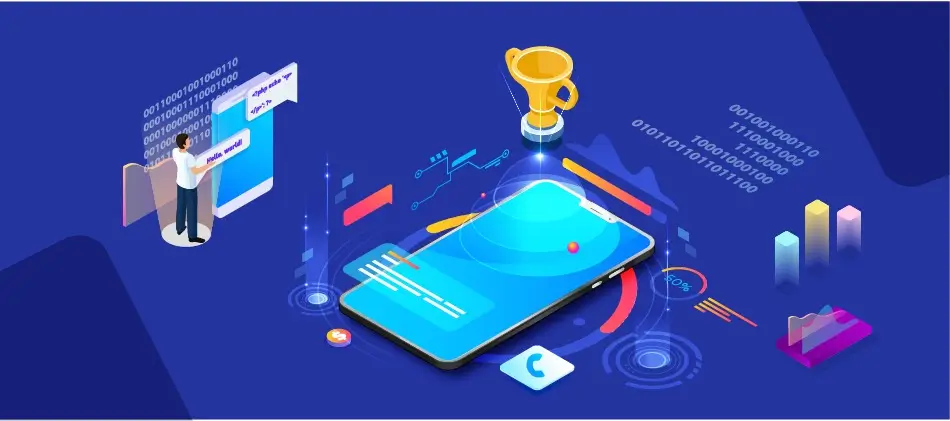
Quantum computing is revolutionizing the way we approach complex problems, offering unprecedented computational power and speed. As we stand at the brink of this new era, quantum application development services have become crucial for businesses looking to leverage quantum computing for real-world applications. This blog explores the essence of quantum application development, its significance, and how companies can integrate this cutting-edge technology into their operations.
The Rise of Quantum Computing
Quantum computing is a game-changing technology that harnesses the principles of quantum mechanics to perform computations far beyond the capabilities of classical computers. By utilizing quantum bits or qubits, quantum computers can solve problems that would take classical computers centuries to process. This transformative potential has led to the rise of quantum application development services, aimed at creating software that can run on quantum computers and address complex challenges in various industries.
Understanding Quantum Application Development
Quantum application development involves creating software and solutions that run on quantum computers. This process requires a deep understanding of quantum mechanics, computer science, and algorithms specifically designed for quantum computing. Unlike traditional software development, quantum app development is still in its infancy, and developers are exploring new paradigms to build efficient and effective quantum software.
The primary goal of quantum app development services is to enable businesses to solve complex problems faster and more accurately than ever before. Industries such as pharmaceuticals, finance, logistics, and materials science are among the early adopters of quantum computing, seeking to optimize processes, develop new drugs, and discover innovative materials.
Key Components of Quantum Application Development
- Quantum Algorithms: The heart of quantum application development lies in the algorithms designed to exploit the power of quantum computing. These algorithms are fundamentally different from classical algorithms and require specialized knowledge to develop.
- Quantum Hardware Integration: Developing quantum software also involves understanding and integrating with quantum hardware. This requires close collaboration with quantum computing companies and staying updated on the latest advancements in quantum technology.
- Hybrid Solutions: Given the current state of quantum computing, many applications are hybrid, combining classical and quantum computing to achieve the best results. Developers must create solutions that seamlessly integrate these two paradigms.
- Security and Encryption: Quantum computing has the potential to break classical encryption methods, making quantum-safe encryption a critical aspect of quantum application development. Developers must ensure that quantum apps are secure and resistant to potential quantum threats.
- User Interface and Experience (UI/UX) Design: While quantum computing may seem purely technical, the importance of UI/UX design services in quantum application development cannot be overstated. A well-designed interface ensures that users can interact with quantum applications intuitively, regardless of the underlying complexity.
Quantum App Development Solutions: Transforming Industries
Quantum app development solutions are not just about creating software; they are about transforming entire industries. Let’s explore some sectors where quantum application development is making a significant impact.
- Pharmaceuticals: Quantum computing’s ability to simulate molecular interactions with unprecedented accuracy is revolutionizing drug discovery. Quantum applications can significantly reduce the time and cost involved in developing new drugs, leading to faster and more effective treatments.
- Finance: The finance industry is leveraging quantum computing to optimize trading strategies, risk management, and portfolio optimization. Quantum applications can analyze vast amounts of financial data in real-time, providing insights that were previously unattainable.
- Logistics and Supply Chain: Quantum computing’s potential to solve complex optimization problems is a game-changer for logistics and supply chain management. Quantum applications can optimize routes, reduce costs, and improve efficiency in ways that classical computing cannot match.
- Materials Science: Quantum computing is enabling the discovery of new materials with unique properties. Quantum applications can simulate and analyze the behavior of materials at the quantum level, leading to breakthroughs in fields such as electronics, energy storage, and manufacturing.
- Artificial Intelligence (AI): Quantum computing is poised to accelerate the development of AI by solving complex problems in machine learning and data analysis. Quantum applications can process vast datasets faster and more accurately, leading to more powerful AI systems.
Challenges in Quantum Application Development
Despite its potential, quantum application development faces several challenges. The technology is still in its early stages, and developers must navigate a steep learning curve. Quantum computing hardware is expensive and not widely accessible, limiting the opportunities for developers to experiment and innovate.
Moreover, the lack of standardized quantum programming languages and development tools adds to the complexity of quantum application development. Developers must often rely on custom-built solutions, which can be time-consuming and costly.
However, these challenges also present opportunities for businesses willing to invest in quantum application development. By getting ahead of the curve, companies can position themselves as leaders in the quantum computing space and gain a competitive edge.
The Role of UI/UX Design in Quantum Applications
As mentioned earlier, UI/UX design services play a critical role in quantum application development. The complexity of quantum computing can be overwhelming, and a well-designed user interface is essential for making quantum applications accessible to users.
UI/UX designers working on quantum applications must strike a balance between functionality and simplicity. The goal is to create interfaces that allow users to interact with quantum applications without needing to understand the underlying quantum mechanics.
Furthermore, as quantum computing becomes more integrated into mobile devices, mobile app development will also play a crucial role in quantum application development. Developers will need to create mobile-friendly quantum applications that offer the same level of performance and usability as their desktop counterparts.
Quantum App Development Software: The Tools of the Trade
Developing quantum applications requires specialized software tools designed to work with quantum computers. Quantum app development software includes programming languages, development environments, and simulation tools that enable developers to create, test, and deploy quantum applications.
Some of the most popular quantum app development software tools include:
- Qiskit: An open-source quantum computing software development framework from IBM, Qiskit allows developers to create quantum circuits, run them on IBM’s quantum hardware, and simulate them on classical computers.
- Microsoft Quantum Development Kit: Microsoft’s Quantum Development Kit provides tools and libraries for quantum app development, including the Q# programming language and integration with Microsoft’s Azure Quantum platform.
- Cirq: Developed by Google, Cirq is a Python library for quantum computing that enables developers to create, simulate, and execute quantum circuits on Google’s quantum processors.
- Forest: Developed by Rigetti Computing, Forest is a quantum programming environment that includes the Quil programming language and tools for developing quantum applications.
These tools are essential for quantum app development and provide developers with the resources they need to build the next generation of quantum applications.
The Future of Quantum Application Development
The future of quantum application development is incredibly promising. As quantum computing continues to advance, we can expect to see more industries adopting quantum applications to solve complex problems and drive innovation.
For businesses, investing in quantum app development services now can provide a significant competitive advantage in the future. By partnering with experienced quantum developers and leveraging the latest quantum app development software, companies can position themselves as leaders in this emerging field.
However, the journey is just beginning. The full potential of quantum computing is still being explored, and the road ahead will be filled with challenges and opportunities. But for those willing to take the leap, the rewards could be transformative.
Frequently Asked Questions (FAQ)
Q1 : What are quantum application development services?
A: Quantum application development services involve creating software and solutions that run on quantum computers, leveraging quantum mechanics to solve complex problems faster and more accurately than classical computing.
Q2 : How do quantum app development solutions benefit businesses?
A: Quantum app development solutions enable businesses to optimize processes, reduce costs, and discover innovative solutions in various industries, including pharmaceuticals, finance, logistics, and materials science.
Q3 : What role does UI/UX design play in quantum applications?
A: UI/UX design is crucial in making quantum applications accessible to users. A well-designed interface ensures that users can interact with quantum applications intuitively, without needing to understand the underlying complexity of quantum mechanics.
Q4 : What challenges do developers face in quantum application development?
A: Developers face challenges such as the steep learning curve of quantum computing, limited access to quantum hardware, and the lack of standardized programming languages and tools, making the development process complex and time-consuming.
Q5 : What is quantum app development software?
A: Quantum app development software includes tools, programming languages, and development environments designed to work with quantum computers, enabling developers to create, test, and deploy quantum applications.
Q6 : What is the future of quantum application development?
A: The future of quantum application development is promising, with advancements in quantum computing expected to drive innovation across industries. Businesses that invest in quantum app development now can gain a competitive advantage as the technology matures.

 Software Development
Software Development Food Delivery
Food Delivery Taxi Booking
Taxi Booking E-Commerce
E-Commerce Real Estate
Real Estate Healthcare
Healthcare



